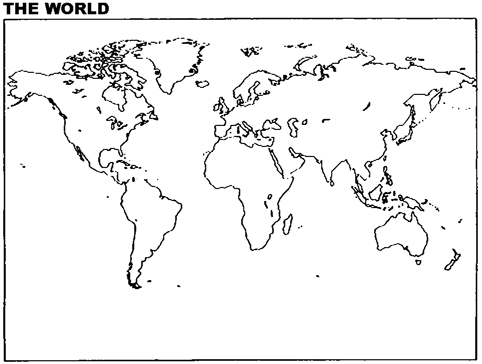Exam 15: The Troubled Present
Key Terms Instructions: Please define the following key terms. Show Who? What? Where? When? Why Important?
Shock Therapy
Shock Therapy refers to a set of economic policies that are often prescribed to rapidly transition a country from a state-controlled economy to a market-oriented economy. The term is most commonly associated with the liberalization efforts in former communist states after the fall of the Soviet Union, but it has been applied in various other contexts as well.
Who?
Shock Therapy policies have been implemented by various governments around the world, often under the guidance or influence of international financial institutions such as the International Monetary Fund (IMF) or the World Bank, and prominent economists like Jeffrey Sachs.
What?
The policies typically involve a rapid series of market reforms including the lifting of price controls, the privatization of state-owned enterprises, the liberalization of trade and investment, and the reduction of government subsidies. These measures are often accompanied by austerity policies aimed at reducing fiscal deficits and controlling inflation.
Where?
Shock Therapy has been applied in several countries, most notably in the former Soviet Union and Eastern Bloc countries during the early 1990s, including Russia, Poland, and the Baltic states. It has also been used in Latin American countries like Bolivia in the 1980s, and in some African and Asian economies undergoing structural adjustments.
When?
The term gained prominence in the 1980s and 1990s, particularly after the fall of the Soviet Union in 1991, when many Eastern European countries sought to quickly transform their economies.
Why Important?
Shock Therapy is important for several reasons:
1. Economic Transition: It represents a radical approach to shifting an economy from a planned to a market-based system, which can lead to significant changes in the structure and performance of the economy.
2. Social Impact: The rapid changes can have profound social consequences, often including increased unemployment, inequality, and social unrest, as the population adjusts to the new economic realities.
3. Political Implications: The success or failure of Shock Therapy can have major implications for the political landscape, influencing the popularity of governments and the stability of the region.
4. Long-term Development: While controversial, proponents argue that Shock Therapy can lay the foundations for long-term economic growth and development by creating a more efficient and dynamic economic system.
Critics of Shock Therapy argue that the rapid pace of reforms can lead to unnecessary hardship for the population, particularly the most vulnerable, and can result in long-term damage to the social fabric and economic infrastructure of a country. The debate over the effectiveness and human cost of Shock Therapy continues to be a significant topic in discussions of economic policy and development.
How did ethnic and religious differences lead to the fighting in the former Yugoslavia?
Ethnic and religious differences played a significant role in the fighting in the former Yugoslavia. The region was home to a diverse population with different ethnic and religious backgrounds, including Serbs, Croats, Bosniaks, and Albanians, as well as Orthodox Christians, Catholics, and Muslims.
These differences led to tensions and conflicts, as different groups sought to assert their own identity and protect their interests. Nationalist and separatist movements emerged, with each group vying for control and dominance. This led to a series of violent conflicts, including the Croatian War of Independence, the Bosnian War, and the Kosovo War.
The manipulation of ethnic and religious identities by political leaders further exacerbated the situation, leading to widespread violence, ethnic cleansing, and war crimes. The breakdown of Yugoslavia and the struggle for power and territory among different ethnic and religious groups ultimately resulted in a devastating and protracted conflict that claimed thousands of lives and displaced millions of people.
In conclusion, the ethnic and religious differences in the former Yugoslavia fueled deep-seated animosities and conflicts, ultimately leading to a series of violent wars and the disintegration of the country.
The German leader that helped to stabilize Germany after 2005 was __________.
C
Yugoslavia became the most troubled of former Eastern European communist countries because of all of the following EXCEPT
During the twentieth century, the world's population has virtually
Key Terms Instructions: Please define the following key terms. Show Who? What? Where? When? Why Important?
Al Qaeda
Key Terms Instructions: Please define the following key terms. Show Who? What? Where? When? Why Important?
Tony Blair
Key Terms Instructions: Please define the following key terms. Show Who? What? Where? When? Why Important?
Boris Yeltsin
Key Terms Instructions: Please define the following key terms. Show Who? What? Where? When? Why Important?
Grozny
Key Terms Instructions: Please define the following key terms. Show Who? What? Where? When? Why Important?
Angela Merkel
Key Terms Instructions: Please define the following key terms. Show Who? What? Where? When? Why Important?
Islamic State of Iraq and Syria (ISIS)
Please use this outline map of the world to answer the question(s).
 -On a map of the World, locate the following present-day hot spots
Afghanistan
Chechnya
Palestine
Israel
Iraq
Iran
Pakistan
-On a map of the World, locate the following present-day hot spots
Afghanistan
Chechnya
Palestine
Israel
Iraq
Iran
Pakistan
According to the textbook, rising anti-Semitism is similar to Nazi anti-Semitism for all of the following except
Key Terms Instructions: Please define the following key terms. Show Who? What? Where? When? Why Important?
The Dayton Agreement
Considering the problem with Islam and Muslim immigrants into Europe, discuss the modern mind-set, traditions, and history of both Western Europe and the Mid East that makes assimilation and acceptance so difficult.
Because of the inefficient factory and economic system in East Germany, unemployment reached ____ percent.
Key Terms Instructions: Please define the following key terms. Show Who? What? Where? When? Why Important?
Bosnian Serbs
Filters
- Essay(0)
- Multiple Choice(0)
- Short Answer(0)
- True False(0)
- Matching(0)